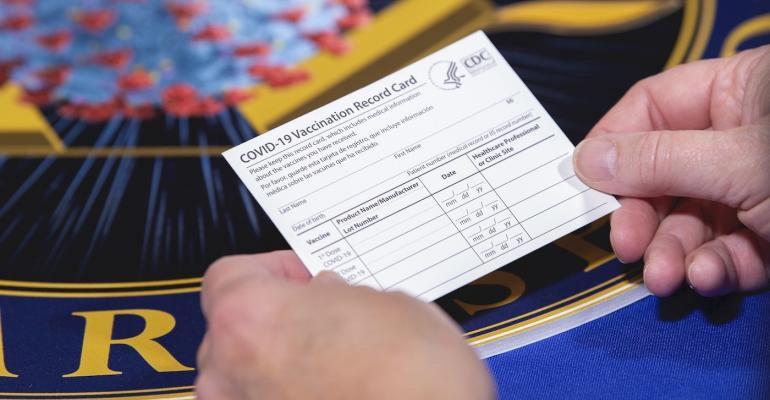Months after multiple cities began requiring proof of COVID-19 vaccination for restaurant diners, a trend is emerging from individual businesses around the country requiring proof of booster shots for employees and customers, including cruise lines, Facebook’s offices, and several restaurants.
Maui County in Hawaii is now requiring booster shots for residents to be considered fully vaccinated to get into restaurants, bars and gyms. But for the most part, restaurants that have implemented three-shot requirements for employees and/or patrons have been going at it alone, without local mandates.
In the San Francisco Bay area, Cassava is one of several restaurants to implement a booster mandate, though the restaurant has temporarily closed due to the sharp rise in omicron cases. Owner Yuka Iori started asking her employees to get a booster shot by the end of October and on Dec. 23 began implementing a booster vaccination for all guests after posting a poll about the contentious topic on the restaurant’s Instagram page.
“We already have a reputation for strictness,” Iori told Restaurant Hospitality. “So, it was not harder to implement [than a regular vaccine mandate].”
Iori said they sent out email blasts to their mailing list and messaged everyone that had dining reservations over the next week and has only had one or two “rude” emails that pushed back on the policy in response. Cassava has been closed since Christmas, but Iori plans to reimplement the policy when she reopens in February or when omicron cases die down.
Baker Miller in Chicago, known for its lunch and brunch menus and fresh baked goods, put a vaccine requirement in place in August. But more recently, the restaurant has upped its precautions to require a negative test plus two doses of a vaccine or booster to dine in, giving people the option if they have not been boosted yet.
Owner Dave Miller said that the restaurant has had a few crazy responses to the booster requirement, including an influencer who threatened to get Baker Miller shut down. Miller said they had to shut down for a few days to keep their employees safe.
“This [booster requirement] limits our business even more than the city already limits it,” Miller said, referencing the Chicago mandate, which currently requires proof of vaccination (but not booster) to dine indoors. “It’s interesting to me when people say, ‘you better be ready for this to hurt your business’ or ‘don’t you know it’s going to decrease your business?’ and we’re like, ‘yeah, we know. We’re the ones suffering.’ But not every decision in life can be made purely for monetary gain. We have a family; we have kids not eligible to be vaccinated and we have at-risk family. So does our team.”
Attorney Alden Parker, co-chair of Fisher Phillips’ hospitality practice, does not believe booster shot requirements will become the norm or as much of a widespread trend for restaurants. He does think it’s much more likely for a fine-dining restaurant to implement since guests are seated (and sharing the same air) with other patrons much longer than a quick-service or fast-casual establishment. However, he doesn’t necessarily think that a restaurant that implements a booster requirement stands to see less business.
“I think with certain clientele you might be poised to gain the number of visits you have by having a booster requirement, while others you might see a decrease,” Parker said.
He said one of the most important things is to remember to communicate with guests and employees well in advance of the rule implementation.
“It takes a concerted effort to put out the information, update your website and reservation system, and have staff incorporate that language into speaking with customers,” Parker said. “You really have to look for all of those touch points and make sure staff are trained to deal with customer questions as they come up.”
This is exactly what Palette Tea House, a dim sum restaurant in San Francisco, did when implementing its booster policy: as guests made reservations on the restaurant’s website, a message pops up remaindering them that they needed full proof of vaccination to dine outdoors and full proof of vaccination plus a booster shot to dine indoors both when they make a reservation and when that reservation is confirmed.
When Palette Tea House implemented the new booster shot policy around Christmas, general manager Dennis Leung said that they began contacting guests that had already made reservations via phone call, and once those reservations are finished, they can begin implementing the requirement at the door.
“Many restaurants had been hit with employees getting COVID,” Leung said. “The loss in business is much greater due to closure than rejecting guests who don't have booster shots. Of course, no policies can help eliminate the spread, but anything is worthwhile to help curb the risks and give our staff extra protection.”
Contact Joanna at [email protected]
Find her on Twitter: @JoannaFantozzi





